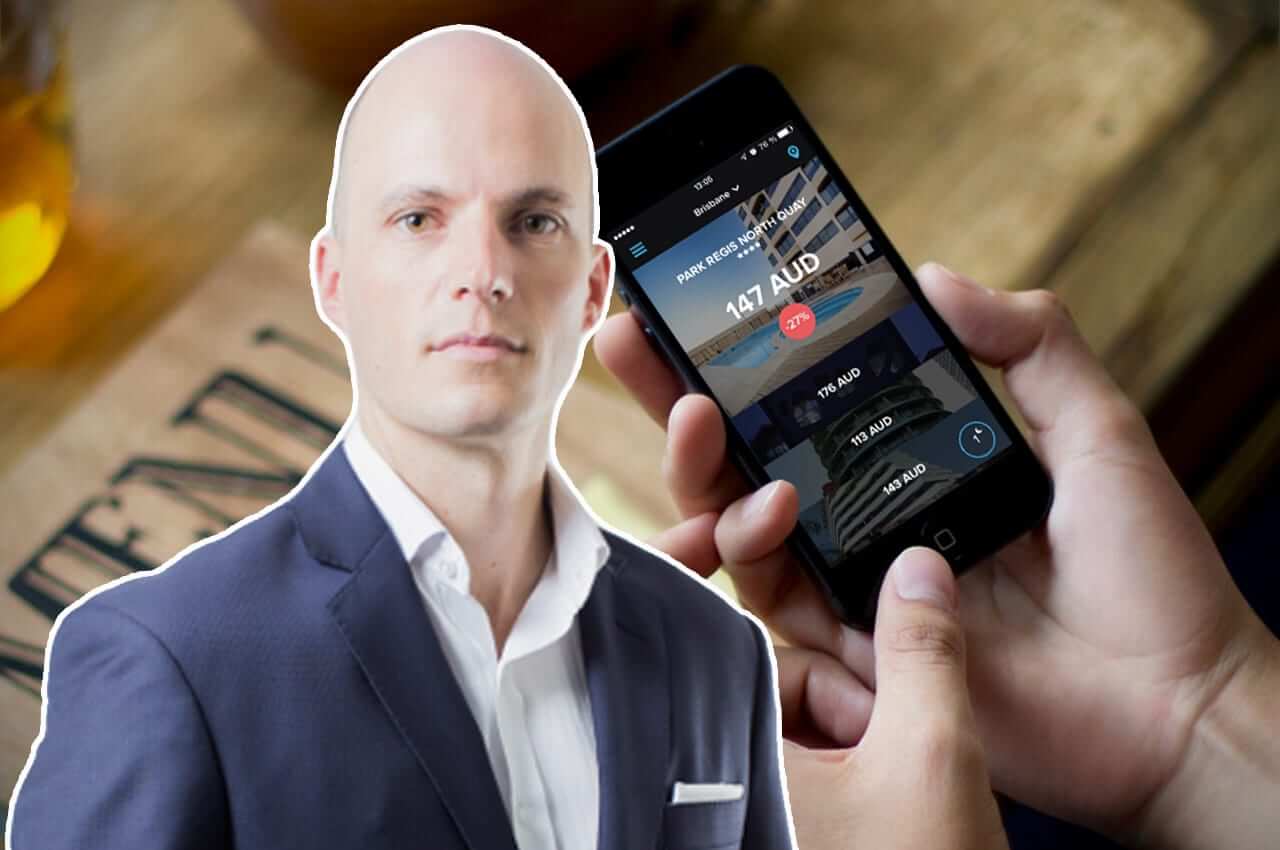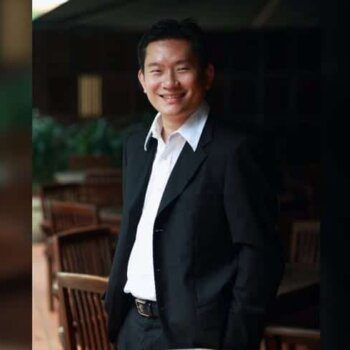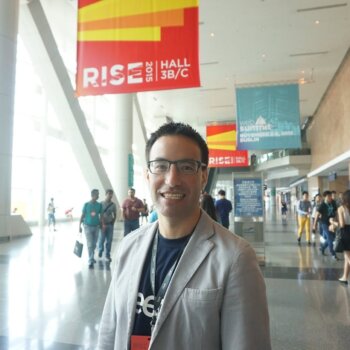From an early age, it was easy to see that Christian Mischler would grow up to be a leader. As a child, he headed his boy scout troop. As a teen, he started his first business. As a young adult, he climbed the ranks of the Swiss army to become a Captain before staking his claim in the business world. But it was his passion for travel that would lead him to co-found Asia-Pacific’s leading last-minute hotel booking app, HotelQuickly.
Growing up in the postcard-worthy town of Hinwil, Switzerland, Christian enjoyed spending time being active outdoors. While the budding entrepreneur was bright, studying was not a particular interest during his adolescence. After a challenging, yet rewarding career in the military where he developed his leadership talents, Christian was inspired to take his education to the next level. He went on to prepare for entrepreneurial life at the University of St. Gallen (HSG), one of Europe’s top business schools. While he earned his undergraduate degree, he founded his second company, a study aid startup called KKarten that would eventually merge with Uniseminar to become the largest publishing house in Switzerland’s educational sector. He continued his postgraduate education in St. Gallen, obtaining a double master’s degree in Banking & Finance, and International Management.
Upon completing his formal education, Christian honed in his business skills at Credit Suisse’s Corporate Development department before Rocket Internet approached him with an exciting opportunity to become Co-Founder and Managing Director of their latest project, foodpanda. Christian accepted the position and flew to Thailand where he was quickly promoted to foodpanda’s CTO and COO, splitting his time between Singapore, Thailand, Vietnam, Portugal, and Colombia.
Spending copious amounts of nights in hotels, Christian took notice of the growing global interest in last-minute hotel booking, and the technology supporting the trend. He and another Rocket Internet colleague began structuring a company to support the needs of last-minute travellers in Asia-Pacific. In 2012, he tapped former classmate Tomas Laboutka to become the fledgling company’s CEO, Raphael Cohen for CSO, and Michal Juhas for CTO. In 2013, Christian gave his official notice at foodpanda, now one of the world’s largest food delivery services, and dedicated his full attention to HotelQuickly as Co-Founder and COO.
Since HotelQuickly’s official launch in March 2013, Christian has helped successfully secure two rounds of fundraising from leading global investors, totalling 5.56m USD. Christian’s achievements gained the attention of his alma mater, and the Bangkok resident was nominated “Entrepreneur of the Year” by the University of St.Gallen in 2013.
Today, Christian calls both Australia and Thailand home, hopping between the two to manage HotelQuickly’s operations. In his fleeting free time, Christian can be found enjoying sports like paragliding, scuba diving, and hiking, capturing the moments with his GoPro. For more information on Christian or the HotelQuickly app, visit www.hotelquickly.com or contact Natalie Compton at [email protected].
In your own words what is HotelQuickly?
We believe people can and should experience last-minute traveling because spontaneous moments enrich life. Therefore, we are serving travellers with HotelQuickly, a mobile product that makes last-minute hotel booking fast and rewarding.
Could you walk us through the process of starting up HotelQuickly?
Starting up HotelQuickly was not necessarily a glamorous process. We had an idea we believed in, and worked tirelessly to lay the groundwork for this company. Long hours, cramped work spaces, and motorcycle taxi rides to investor meetings stand out the most when I think back to the early days. After we assembled a team, started building the app, and finished our first round of fundraising, we have continued to grow across the region in both users and HotelQuickly team members. We now have more than 50 employees and more than 700,000 downloads of the app.
Did you encounter any particular difficulties during startup and if so, how did you guys overcome it?
Of course we encountered difficulties, but that’s what made the experience even more rewarding. Being from Europe, our founding team really had to work to overcome the obstacles of starting a business in Southeast Asia. The region is so incredibly diverse, so operating in a way to appeal to so many varied cultures was a major challenge. We combatted the difficulty by hiring talented team members in our local markets to better navigate the needs of our customers.
How have you been developing HotelQuickly since startup?
We’ve created our MVP with extremely limited features and went live with only 6 hotels in a number of cities, deals were only bookable from 12pm until 2am the next morning. We’ve stayed laser-focused on the niche of last-minute travelling and serving that space better than anyone else, hence we assess each feature request carefully in order not to overload or clutter our app while still providing all necessary features to make booking a last-minute hotel a breeze. The app now is incomparable to the first version, but it’s still extremely focused on spontaneous last-minute traveling.
What kind of feedback did you get for HotelQuickly so far?
We’re lucky to get a lot of positive feedback from our members, as well as from media, bloggers, and business partners. The time was perfect for us to enter this market almost 2 years ago. User adoption is growing exponentially as our members refer others to download HotelQuickly (we have a nice reward system built into the app). Some members would like us to expand faster and add more destinations, but building up a regional footprint naturally takes time.
Do you face a lot of competition in this industry especially from companies like Hotel Tonight?
We do face competition from regional players like Agoda and Wotif. HotelTonight will also be a contender when they get to Asia Pacific. We are currently the leading last-minute hotel booking app in the region, and have managed to stay competitive with these giants by really learning from local travelers and delivering a product made for them. To do this well, we have taken the time and resources to invest in setting up teams on the ground in our markets.
Have you developed any industry insights that you could share?
What is obvious to any Asian but might come as a surprise to Westerners is that Asia is not just Asia. Any country we operate in has its own challenges, be it language, currencies, development stage, availability of infrastructure, laws & regulation, etc. We had to fully localize our operations while to the end customer appear to be a truly regional product. This had impacts on product development, marketing, and many other business areas.
In South East Asia the market is largely served by Agoda, which is the top of mind online travel agent in many countries. This made things easier for us. In other countries it’s a little more fragmented, and we had to fit into the market, deal with various different preferences of hoteliers and come up with solutions to serve their needs better than a set of different OTAs.
What is the future of the industry and how do you plan to stay relevant in this industry?
It has been amazing to watch the exponential growth of mobile solutions in the travel industry. Mobile penetration is expanding rampantly, and in turn, companies are finding ways to help customers through smart phones more than ever before. We have seen lots of research pointing to the continuation of this trend, and can expect to see more and more travelers planning, booking, and executing travel on mobile devices versus traditional tools.
Were there anything that disappointed you initially?
Our app offers a pretty specific service that doesn’t initially appeal to every type of traveler. It can be disappointing not to be able to impress everyone who could benefit from HotelQuickly because of the nontraditional nature of the app.
What do you think about being an entrepreneur in Asia?
Being an entrepreneur in Asia has its pros and cons just like working in any other world region. There are many obstacles to doing business in a foreign country from not knowing the local language to dealing with a different set of laws and regulations. One major benefit of being an entrepreneur in Asia is having the invaluable learning experience. Every day you are faced with something new and uncomfortable, and you grow an incredible amount personally and professionally.
What is your opinion on Asian entrepreneurship vs Western entrepreneurship?
There are certain aspects of Western entrepreneurship that are easier to navigate, such as assembling a team of English speakers, but it lacks a major factor. Asian entrepreneurship is so exciting because of the potential for exponential growth that is nearly impossible in the West.
What is your definition of success?
Success is different for everyone, but to me it is seeing ideas become realities. When we wanted to help people find solutions to spontaneous travel challenges, we started with just an idea. Now, seeing HotelQuickly really helping spontaneous travelers is success to me.
Why did you decide to become an entrepreneur?
I was always interested in leadership positions, and becoming an entrepreneur seemed like a natural career fit for me. I was eager to take the plunge into entrepreneurship from early on, starting my first business in college. After finishing school and testing the waters in a few different positions (entrepreneurial and corporate), I was more than ready to continue down the path of entrepreneurship and launch HotelQuickly with the other founding partners.
In your opinion, what are the keys to entrepreneurial success?
Hard work is a mandatory component of finding entrepreneurial success. You’re going to have to choose late nights at the office over long dinners with your loved ones more times than you’d like, but it’s necessary if you want to make your dreams a reality. Flexibility is also critical. You have to be ready to face unexpected challenges as they hit you, often at very inconvenient times. Don’t stay stagnant, but stay flexible and grow with your venture.
Any parting words of wisdom for entrepreneurs out there from your personal experience?
Becoming an entrepreneur takes great discipline and patience. Don’t get discouraged when you don’t get $400m in your first round of fundraising. This is an exhausting, and often thankless, career path that will test you constantly. When things work out, it’s rewarding beyond belief – hang in there.





























